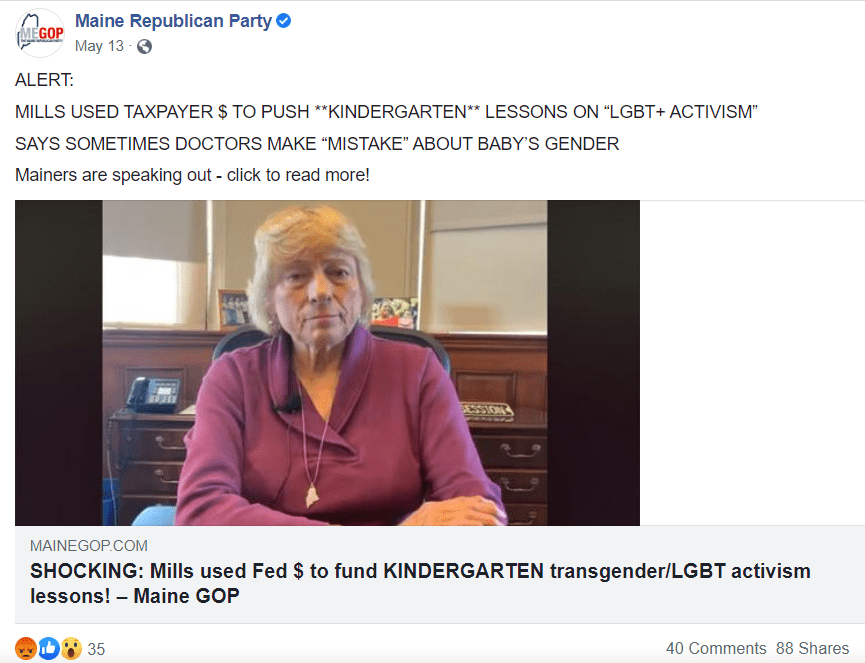As a teaching module explaining transgender identity to young school kids made the rounds on conservative social media in May, the Maine Department of Education raced to figure out a response to mounting political criticism of the video.
Part of an optional learning program called MOOSE, the video first surfaced when the conservative Twitter account LibsofTikTok featured it on Monday, May 2. On May 13, the Maine Republican Party posted about the video on its Facebook page, calling it an example of “LGBT+ activism” allowed by Gov. Janet Mills. That same day, the DOE contacted the former Whitefield kindergarten teacher who created the video, saying they needed to talk about it.
By May 16, DOE and Mills’ office officials were moving quickly to figure out how to respond, according to emails from May 9 to May 23 obtained through a Freedom of Access Act request. When Mills’ communication director Scott Ogden suggested a general meeting about the online curriculum, Education Commissioner Pender Makin pressed to deal with the specific video immediately because it was getting attention.
“… I think we need to address the MOOSE issue asap (ideally today) because we are already getting questions from superintendents and from legislators,” she wrote around noon on May 16. “I’m sure we’ll have media inquiries soon.”
By the end of the day, emails show, the decision to remove the video had been made. By Tuesday, May 17, the entire module would be taken down, hours before the Maine Republican Party featured the video as part of its opening salvo in the gubernatorial race. It was the first example in Maine of a national Republican strategy to target LGBTQ+ material in schools.
The Mills administration has consistently said that the video was taken down because it was not age-appropriate for children, and not because of the GOP attack ad. But emails and interviews show that the administration responded just on the heels of Republicans’ focus on the video and was particularly concerned about a line in the video saying doctors sometimes make mistakes about a baby’s gender when it is born. That’s the passage that Republicans focused on.

The administration considered editing the video and returning it to the module, according to the teacher who created it, but never did. That could have prevented the appearance that the administration was responding to the GOP’s attacks, and would have provided at least some inclusive materials for teachers, said its creator and the executive director of Maine’s biggest LGBTQ+ advocacy group.
“I think the content could have been better delivered, but it was better than not having (transgender-focused content) at all,” said Gia Drew of Equality Maine.
The video was created during the spring of 2020, in the early months of the pandemic through a $2.8 million federal grant. It was part of a module for children in preschool through second grade teaching about “Freedom Holidays,” including Juneteenth, the Fourth of July and Pride. It featured the teacher, former Whitefield kindergarten instructor Kailina Mills, explaining the transgender identity as someone who does not identify with the gender they were assigned at birth.
Kailina Mills would later criticize Gov. Mills’ decision to remove the video, accusing the governor of caving to political pressure instead of standing up for vulnerable people in Maine.
Video alarmed Republicans
The controversy unfolded just a few days after the Maine GOP adopted a platform on April 29 calling for the state to limit the teaching of LBGTQ+ issues in public schools. That stance reflected the focus by Republicans nationally to stop inclusive teachings, including forbidding teachers from teaching about hormone replacement therapy or sexes beyond male and female.
That tactic did not last long; the state Republican Party largely focused on the economy, heating oil prices and federal lobstering regulations for the rest of the campaign. It was not enough to win Republicans back the Blaine House or the State House. Former Gov. Paul LePage lost to Mills by 13 percentage points and Democrats maintained control in both chambers.
Maine Republican Party Executive Director Jason Savage said he first heard about the education video at the party convention. He would not go into detail about how it was selected for an attack ad, but said the video’s line about doctors making mistakes, coming during a pandemic and targeting a young age group, alarmed him and other Republicans who saw it.
The Maine Republican Party’s first campaign ad went further, saying Mills used the $2.8 million federal grant to create “radical” lessons for children.
Savage, in an interview last week, denied that the video was meant as an attack on LGBTQ+ issues. He said it was meant to cast the video as confusing and not appropriate for children.
“I get upset when people say it’s about the culture wars,” he said. “Even people on the other side said it was not appropriate.”
DOE spokesperson Marcus Mrowka said Makin had been fielding questions about the MOOSE program from superintendents before May 16, but declined to say when.
Spokespeople from the Maine Superintendents Association and the Maine School Management Association said members of their groups never brought the module to their attention. They said they became aware of it when it was featured in the GOP’s ad. However, it is possible that individual members reached out to the DOE, they said.
But Kailina Mills, the teacher who speaks in the module, said the DOE first reached out to her on May 13, the day the Republicans’ Facebook post went live. She spoke with a DOE employee on the afternoon of May 16.
The employee was concerned about the line about doctors making mistakes – specifically, that people could extend that to questioning doctors who recommend vaccines, she said. But the overall topic and content of the video was supported by the state.
Kailina Mills, who is not related to the governor, said she and the department employee agreed that the video could be edited to say “people make mistakes” in identifying gender. But when the GOP’s ad went public, the teacher said she contacted the department and has not heard back since.
“I felt like I was being dismissed,” she said last week.
Also reaching out to the department and the governor’s office on May 16 was state Rep. Paul Stearns, R-Guilford, who wanted to know if the administration was going to respond.
“Is (the governor) aware of the specific content of this model lesson?” he asked Mills’ senior policy analyst Joseph Marro. “I am hoping it was an oversight.”
Stearns said in a later interview that he had seen the GOP’s Facebook post over the weekend.
Mrowka said Gov. Mills did not know about the video before it went up, and was not part of the discussions on whether to remove it. Those discussions were heavily driven by Makin, DOE employees and governor’s office personnel, according to the emails.
By 8:31 p.m. on May 16, the decision to take the video down was made, according to Makin’s response to Stearns. She told him it was “not something we’d recommend including as kindergarten instruction” and should have been reviewed further by a DOE specialist overseeing Kailina Mills and other teachers.
“We checked in today with the specialist … she concurs the lesson is not appropriate for K students and apologizes for the oversight,” Makin wrote.
The video did not appear to be fully removed until late evening on Tuesday, May 17, after a Portland Press Herald reporter inquired about the GOP’s plan to release its attack ad.
“Here we go,” Mrowka wrote to Makin and others around 9 p.m. about the request for comment. The state officials sent several emails back and forth asking about Kailina Mills, and how much she was paid for her work.
By 9:35 p.m., Makin said, the entire gender identity lesson that the video was part of was removed; half an hour later, the whole module was taken down because it was quicker to do so. She asked if the module should be reposted without the lesson, but did not get a response in the emails. It had been just over two weeks since the video first appeared on social media and just a few days since the Maine GOP highlighted it.
Six months later, Mrowka, Makin’s spokesperson, said the MOOSE module program is still being reviewed. He said the department plans to update the first year of modules, along with new material.
Fallout from state’s decision
Mills has said she did not know about the video but agreed with the decision to remove it. She does not appear in the emails between her office and the DOE until Friday, May 20 — after the video was taken down.
A parent of a transgender child castigated the decision.
“The speed with which you caved to disingenuous Republican messaging does not bode well for the state,” the writer, whose name was redacted in accordance with state right-to-know laws concerning correspondence between officials and constituents, said in an email to Makin and Mills. “…I hope you’ll reconsider your politicking around such dishonest attack ads and be more vocal champions for our most marginalized students.”
A version of a response to the parent crafted by staff said the video could have led students to distrust doctors or think transgender people are a mistake, which could be harmful to them.
“I can say to you unequivocally that the lesson was not removed from MOOSE because of the Maine Republican Party’s TV ad,” the draft response from Mills read.
The video and the attack ad were just blips in the governor’s race. But the frustration continued for Kailina Mills. She said she received death threats about the video – it showed her face, and the module listed her as its creator – after it was circulated by conservatives. She did not report those to law enforcement, but did feel unsafe for some time, she said.
Kailina Mills said she would like to see the module put back up, because the DOE’s concerns could easily be addressed.
“The LGBTQ community isn’t a monolith,” she said. “There might be different views about what’s the right thing to say.”
But for Drew at Equality Maine, the situation, particularly the lack of vetting of the video before it was posted on the state site, highlighted how little focus there is on LGBTQ topics in public education. Such attention is needed more than ever, she said, as as conservative activists continue to push the idea that children introduced to material and stories about queer identities are being “groomed” for predators.
Drew noted the shooting at an LGBTQ nightclub this month in Colorado — where five people were killed when a gunman opened fire — as a direct consequence of such efforts. Even if the language used in the video was not perfect, she said, it is better to teach children about transgender lives.
“Did the Democrats mishandle the situation? Maybe,” she said. “But what the GOP is doing is far worse. Kids get hurt in this process more than anybody.”
Caitlin Andrews covers state politics and elections for The Maine Monitor. Reach her by email with other story ideas: gro.r1751759593otino1751759593menia1751759593meht@1751759593nilti1751759593ac1751759593.








